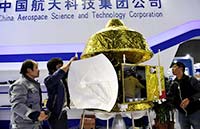US urged to respect China's interests
By Qin Zhongwei and Zhao Shengnan (China Daily) Updated: 2012-07-13 02:20
|
 Foreign Minister Yang Jiechi shakes hands with US Secretary of State Hillary Clinton before their talks in Phnom Penh on Thursday. [Photo by Agencies] |
US urged to respect China's interests in the Asia-Pacific
China hopes the United States will respect the interests and concerns of China and other countries in the Asia-Pacific region, Foreign Minister Yang Jiechi said on Thursday.
Yang made the remarks as he met US Secretary of State Hillary Rodham Clinton in Cambodia.
The region is where the interests of China and the US are the most intertwined and where the two countries most frequently interact, said Yang, who met Clinton on the sidelines of the Association of Southeast Asian Nations Foreign Ministers' Meeting in Phnom Penh.
China and the US should establish a pattern of interaction in the Asia-Pacific that features win-win cooperation, Yang said.
Yang was also quoted by Reuters as saying that Beijing was ready to work with Washington "to expand our common ground, respect each other, properly handle differences on sensitive issues and push forward" relations.
Clinton said that the US is committed to developing a positive, cooperative and comprehensive relationship with China, adding that the US-China relationship is very important.
 |
|
Chinese Foreign Minister Yang Jiechi (second right, bottom row) joins hands with other foreign ministers during the opening of the East Asia Summit held on the sidelines of the Association of Southeast Asian Nations Foreign Ministers' Meeting on Thursday in Phnom Penh. Tang Chhin Sothy / Agence France-Presse |
Ahead of the meeting with Yang, Clinton told reporters that the two countries "not only can, but will, work together in Asia".
The US has no territorial claims in the region and will not "take sides in disputes about territorial or maritime boundaries", Clinton told the foreign ministers gathered in Cambodia's capital. She said the US has "an interest in freedom of navigation, the maintenance of peace and stability, respect for international law and unimpeded lawful commerce in the South China Sea".
But experts said China has repeatedly claimed that all countries enjoy full freedom of navigation in the South China Sea. "China never damages such freedom in the South China Sea, which a large number of vessels cross every day," said Fan Jishe, a US-studies expert at the Chinese Academy of Social Sciences. Fan added that the issue is an excuse used "by some countries to be hostile to China".
Clinton's tone, which expressed a willingness to cooperate, is in line with Washington's neutral stance over the maritime disputes between China and some of its Southeast Asian allies, said Shen Yamei, a researcher on American studies with the China Institute of International Studies.
"The US doesn't want its ties and cooperation with China to be affected by the Philippines' competing claim with China over the South China Sea," said Shen, adding that the US was unhappy with its allies lobbying it and misrepresenting the US on the issue.
Clinton arrived in Cambodia on Wednesday from Laos, where she was the first top US diplomat to visit in nearly 60 years. Her extensive tour of Asia also covers stops such as in Mongolia and Vietnam.
The Christian Science Monitor said on Tuesday that Clinton's ongoing visit in Asia contrasts sharply with the message she carried to Southeast Asia when she last visited in 2010. Her trip then was portrayed less as a business and trade mission and more as an opportunity to put China on notice that the United States will serve as a counterbalance in the South China Sea.
Her remarks this time are less sharp to avoid tension, which is in the interest of both sides, Fan said.
Meanwhile, most Southeast Asia countries without maritime disputes with China are eager to cool down tensions in the region and have a mutually beneficial cooperation with China, he added.
Southeast Asian countries were divided on Wednesday over how to deal with recent disputes with Beijing as the Philippines is leading a push for a united ASEAN to propose to China a code of conduct for the South China Sea, AFP reported.
Thailand will not allow disputes in the South China Sea to obstruct cooperation between ASEAN and China, Thailand's Foreign Ministry said on Wednesday, according to the Bangkok-based newspaper The Nation.
Contact the writers at qinzhongwei@chinadaily.com.cn and zhaoshengnan@chinadaily.com.cn
Xinhua contributed to this story.
- China-Vietnam border major channel for drug smugglers
- China to speed up restructuring of zombie SOEs
- Singapore plays positive role in ties between mainland and Taiwan
- Success of Fox Hunt campaign continues
- SOE changes aim to improve efficiency
- Major farm reform on the horizon
- Deadline set for hukou revisions
- Tibetans weave faith into music
- Xi-Ma meet to lead cross-Strait high-level exchanges
- English skills slip in China: survey







